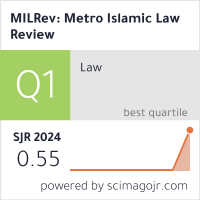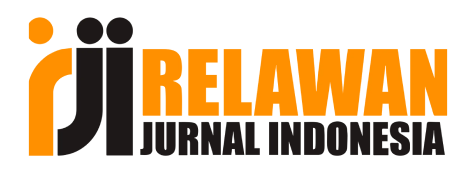Enhancing Employability in the Digital Era: A Case Study of Online Workers Through the Lens of Contemporary Islamic Economic Law
DOI:
https://doi.org/10.32332/milrev.v4i1.10223Keywords:
Digital Era, Contemporary Islamic Economic Law, Online Workers, Work Competence.Abstract
The digital era has changed the workforce significantly, especially with the rise of online-based jobs. This study aims to analyze the enhancement of online workers' employability through the perspective of contemporary Islamic Economic Law. The research employs a qualitative approach with a case study of online workers across various sectors. The findings indicate that digitalization has expanded job opportunities and introduced challenges such as income instability and a lack of legal protection. From the perspective of Islamic Economic Law, principles of justice, balance, and ethics in transactions play a crucial role in ensuring the sustainability and well-being of online workers. Therefore, appropriate regulations aligned with Islamic economic principles are needed to promote fairness and welfare for workers in the digital era. The main contribution of this study is to provide new insights into the application of Islamic Economic Law principles in the context of digital employment and offer policy recommendations to enhance the well-being of online workers. Additionally, this research contributes to developing Islamic digital economy literature and serves as a foundation for more inclusive and fair regulations for workers in the digital age.
Downloads
References
Abdul, W. “Undian Berhadiah Alfamart di Kota Bengkulu dalam Perspektif Ekonomi Syari’ah.” Al-Istinbath: Jurnal Hukum Islam 4, no. 1 (2019): 1–14. https://doi.org/10.29240/jhi.v4i1.634.
Adzkiya, Ubbadul. “Analisis Maqashid Al-Syariah Dalam Sistem Ekonomi Islam Dan Pancasila.” JESI (Jurnal Ekonomi Syariah Indonesia) 10, no. 1 (31 Agustus 2020): 23–35. https://doi.org/10.21927/jesi.2020.10(1).23-35.
Alauddin, Farah Diba Almayanda, Aini Aman, Mohd Fahmi Ghazali, dan Sity Daud. “The influence of digital platforms on gig workers: A systematic literature review.” Heliyon 11, no. 1 (15 Januari 2025): e41491. https://doi.org/10.1016/j.heliyon.2024.e41491.
Alfian, Ian, Azhari Akmal Tarigan, Rahmi Syahreza, dan Ahmad Riyansyah Parinduri. “Economic Welfare on Justice, Faith And Blessing Based on The Qur’anic Perspective.” Jurnal Ilmu Ekonomi Dan Bisnis Islam 6, no. 2 (31 Desember 2024): 190–203. https://doi.org/10.24239/jiebi.v6i2.313.190-203.
Aljumah, Abdulsalam. “The Impact of Job Training on Recruitment and Employability Skills Among Graduates.” International Journal of Professional Business Review 8, no. 10 (10 Oktober 2023): e02806–e02806. https://doi.org/10.26668/businessreview/2023.v8i10.2806.
Amalia, Dhuha Trieska, dan Seger Handoyo. “Peran Psychological Empowerment dalam Hubungan antara Empowering Leadership dengan Perilaku Kerja Inovatif.” Jurnal Psikologi Teori dan Terapan 9, no. 77–90 (2018): 2087–1708.
Aravik, Havis. “Konsep Buruh Dalam Perspektif Islam.” Islamic Banking : Jurnal Pemikiran Dan Pengembangan Perbankan Syariah 4, no. 1 (10 Agustus 2018): 1–10. https://doi.org/10.36908/isbank.v4i1.50.
Aroles, Jeremy, Dubravka Cecez-Kecmanovic, Karen Dale, Sytze F. Kingma, dan Nathalie Mitev. “New ways of working (NWW): Workplace transformation in the digital age.” Information and Organization, New Ways of Working: Rematerializing Organization in the Digital Age, 31, no. 4 (1 Desember 2021): 100378. https://doi.org/10.1016/j.infoandorg.2021.100378.
Belloc, F. “A simple comparative model of worker-managed and capital-managed digital platforms.” Metroeconomica 76, no. 1 (2025): 162–91. https://doi.org/10.1111/meca.12482.
Burns, K., O. Halvey, F. O̗ Su̗illeabha̗in, E. O’Callaghan, dan G. Coelho. “The Social Media, Online and Digital Abuse and Harassment of Social Workers, Probation Officers and Social Work Students in Ireland: A National Survey.” British Journal of Social Work 54, no. 7 (2024): 3274–94. https://doi.org/10.1093/bjsw/bcae091.
Choerunnisa, Najwa, Amara Mukti Rahayu, Azkia Mutia Rachma, dan Enjum Jumhana. “Transformasi Pasar Kerja Dalam Perspektif Hukum Terhadap Tren Freelance Dan Remote Work Di Era Globalisasi.” SYARIAH : Jurnal Ilmu Hukum 2, no. 2 (23 Januari 2025): 294–98. https://doi.org/10.62017/syariah.v2i2.3862.
Dirwan, dan Rajindra. “Human Resources Transformation in the Digital Era: Success Strategies for the Future.” International Journal of Health, Economics, and Social Sciences (IJHESS) 5, no. 4 (29 Oktober 2023): 484–87. https://doi.org/10.56338/ijhess.v5i4.4293.
Faizin, Mu’adil, Dhea Thalesya Zahra, Lutfina Lutfina, dan Seja Riyandani. “An Analysis Of Employment Termination For Freelance Workers: A Justice Approach From Islamic Economic Law.” ASAS 16, no. 1 (5 Agustus 2024). https://doi.org/10.24042/asas.v16i1.22571.
Fattah, Abdul. “Implementasi Maqashid Syariah Dalam Ekosistem Ekonomi Dan Keuangan Syariah Di Indonesia: Analisis Pencapaian Kesejahteraan Sosial Dan Ekonomi Berkelanjutan.” El-Iqthisady : Jurnal Hukum Ekonomi Syariah, 8 Desember 2024, 194–208. https://doi.org/10.24252/el-iqthisady.vi.52302.
Handoyo, ADPS, dan A. P. Putri. “The impact of career growth on turnover intention with employee engagement as a mediator variable: Study among the generation y employees in indonesia.” Improving Mental Health and Harmony in Global Community, 2020, 216–23.
Handoyo, Seger, Samian Samian, Dewi Syarifah, dan Fendy Suhariadi. “The Measurement of Workplace Incivility in Indonesia: Evidence and Construct Validity.” Psychology Research and Behavior Management Volume 11 (Mei 2018): 217–26. https://doi.org/10.2147/PRBM.S163509.
Helaluddin, dan Hengki Wijaya. Analisis Data Kualitatif: Sebuah Tinjauan Teori & Praktik. Sekolah Tinggi Theologia Jaffray, 2019.
Hosen, Muhammad Nadratuzzaman, dan Deden Misbahuddin Muayyad. “Mendudukkan status hukum asuransi syariah dalam tinjauan fuqaha kontemporer.” Ijtihad : Jurnal Wacana Hukum Islam dan Kemanusiaan 13, no. 2 (30 Juni 2013): 219–32. https://doi.org/10.18326/ijtihad.v13i2.219-232.
Hussein, Mohamed G. “Exploring the Significance of Soft Skills in Enhancing Employability of Taif University Postgraduates: An Analysis of Relevant Variables.” Sage Open 14, no. 3 (1 Juli 2024): 21582440241271941. https://doi.org/10.1177/21582440241271941.
Ikhsan, Muhammad Arif. “Keabsahan Kontrak Kerja Freelance Dengan Media Digital Di Amazone Pontianak Dalam Pandangan Hukum Islam Kontemporer.” Al-Maslahah : Jurnal Ilmu Syariah 14, no. 1 (1 April 2018): 139–62. https://doi.org/10.24260/al-maslahah.v14i1.1010.
Irianti, Rini. “Internalisasi Prinsip - Prinsip Islam Tentang Etika Kerja dalam Perlindungan Hak Pekerja dan Pelaksanaan Hak Atas Pekerjaan.” Syiar Hukum : Jurnal Ilmu Hukum 12, no. 2 (2010): 178–88. https://doi.org/10.29313/sh.v12i2.636.
Jackson, Denise, Claire Lambert, Ruth Sibson, Ruth Bridgstock, dan Matalena Tofa. “Student employability-building activities: participation and contribution to graduate outcomes.” Higher Education Research & Development 43, no. 6 (17 Agustus 2024): 1308–24. https://doi.org/10.1080/07294360.2024.2325154.
Khoiruddin, M., Imam Syafi’i, dan Ahmad Fajri. “Sistem Pengupahan Pekerja Dalam Perspektif Ekonomi Islam (Studi Kasus Di CV. Motor Jaya 2 Gending).” Jurnal Ekonomi Syariah Pelita Bangsa 9, no. 01 (27 April 2024): 194–203. https://doi.org/10.37366/jespb.v9i01.1317.
Kryzhanivska, K., T. Tuomisalo, K. Blomqvist, dan O. Kuivalainen. “Leveraging temporary teams for international opportunity creation on digital platforms.” Information and Organization 35, no. 1 (2025). https://doi.org/10.1016/j.infoandorg.2024.100554.
Larasati, Lidia Dwi, Muhammad Ali Adriansyah, dan Dian Dwi Nur Rahmah. “Pengaruh Motivasi Kerja dan Pengembangan Karir Terhadap Kinerja Karyawan.” Jurnal Ilmiah Psikologi 9, no. 4 (2021): 783–98.
Leng, A., M. Sun, dan J. Shi. “Risk control strategies for inventory pledge financing on cross-border e-commerce platforms empowered by the digital economy.” Omega (United Kingdom) 133 (2025). https://doi.org/10.1016/j.omega.2024.103251.
Maghrifani, Dila, Adennia Oktaviana Fadli, dan Aref Mahdavi Ardekani. “Workplace Digital Transformation: Impact of Employees’ Autonomy and Relatedness to Employees’ Intention Actively Support Digital Transformation.” Sebelas Maret Business Review 7, no. 2 (27 Desember 2022): 102–9. https://doi.org/10.20961/smbr.v7i2.73472.
Maksum, Muhammad, dan Nur Hidayah. “The Mechanism of Avoiding Riba in Islamic Financial Institutions: Experiences of Indonesia and Malaysia.” JURIS (Jurnal Ilmiah Syariah) 22, no. 2 (15 Desember 2023): 235–44. https://doi.org/10.31958/juris.v22i2.6952.
Mäntymäki, Matti, Abayomi Baiyere, dan A. K. M Najmul Islam. “Digital platforms and the changing nature of physical work: Insights from ride-hailing.” International Journal of Information Management 49 (1 Desember 2019): 452–60. https://doi.org/10.1016/j.ijinfomgt.2019.08.007.
Ma’zumi, Ma’zumi. “Maqashid Al-Syariah Dalam Perilaku Ekonomi.” Syi`ar Iqtishadi : Journal of Islamic Economics, Finance and Banking 3, no. 1 (29 Mei 2019): 80–98. https://doi.org/10.35448/jiec.v3i1.5516.
Nasfi, Nasfi, dan Sabri Sabri. “Maqashid Syariah Sebagai Basis Pengembangan Ekonomi Islam.” El-kahfi | Journal of Islamic Economics 3, no. 01 (3 April 2022): 205–9. https://doi.org/10.58958/elkahfi.v3i01.81.
Nurfadilah, Aninda, Aris Syafaat, Kholik Fazrin Harahap, Amat Oky Nofriansah, Lukmanul Hakim, dan Jani Arni. “Islamic Economic Ethics and Relevance in Era Global Capitalism : Study of Interpretation Verses of Commerce.” Hamalatul Qur’an : Jurnal Ilmu Ilmu Alqur’an 5, no. 2 (23 Desember 2024): 729–39. https://doi.org/10.37985/hq.v5i2.305.
Rafi’i, Muhammad, Fadia Fitriyanti, Moh Lubsi Tuqo Romadhan, Susila, dan Nada Luqyana Mumtazah. “The Position of Online Ojek Based on the Perspective of Islamic Law.” International Journal of Social Science and Business 6, no. 4 (10 November 2022): 553–60. https://doi.org/10.23887/ijssb.v6i4.51193.
Rahma, Aneka, Khairuddin, Anita Niffilayani, dan Mohammad Eisa Ruhullah. “Policy Implications of the TikTok Shop E-Commerce Platform in the Contemporary Era: A Siyasah Syar’iyyah Perspective.” MILRev: Metro Islamic Law Review 3, no. 2 (30 Desember 2024): 343–63. https://doi.org/10.32332/milrev.v3i2.9859.
Samad, Telsy Fratama Dewi, dan Anggoro Sugeng. “The Role of the Islamic Economic System in Achieving Fallah.” Adzkiya : Jurnal Hukum Dan Ekonomi Syariah 10, no. 02 (30 November 2022): 175–86. https://doi.org/10.32332/adzkiya.v10i02.5295.
Sardar, Ziauddin, dan Muhammad Nafik. “Kesejahteraan Dalam Perspektif Islam Pada Karyawan Bank Syariah.” Jurnal Ekonomi Syariah Teori Dan Terapan 3, no. 5 (2016): 391–401. https://doi.org/10.20473/vol3iss20165pp391-401.
Soebarna, Ahmad Baihaqi. “Etika Bekerja Dalam Islam: Analisis Hadith-Hadith Relasi Etika Buruh Majikan.” Himmah: Jurnal Kajian Islam Kontemporer 7, no. 1 (1 Agustus 2023): 640–49. https://doi.org/10.47313/jkik.v7i1.2548.
Sudana, Sudana, Marpuah Marpuah, Muhammad Jagat Dermawan, Muhammad Gilang Samudra, dan Mujahid ’Ayyasy Alfaqih. “Islamic Principles of Justice in Cross-Cultural Business Transactions: A Phenomenological Study in Indonesian Multicultural Business Context.” Kawanua International Journal of Multicultural Studies 5, no. 2 (28 Desember 2024): 215–41. https://doi.org/10.30984/kijms.v5i2.1188.
Sugiarto, Irwan. “Human Resource Development Strategies to Achieve Digital Transformation in Businesses.” Journal of Contemporary Administration and Management (ADMAN) 1, no. 3 (10 November 2023): 156–62. https://doi.org/10.61100/adman.v1i3.66.
Suprap, Suprap, Muhammad Sayuti, Budi Santosa, Muhammad Kunta Biddinika, Harry Agus Susanto, dan Noviatun Hasanah. “Special Job Exchange Strategies for Enhancing Graduate Employability in Vocational High Schools Center of Excellence in Yogyakarta and Central Java.” Journal of Vocational Education Studies 7, no. 2 (30 November 2024): 350–63. https://doi.org/10.12928/joves.v7i2.11649.
Susamto, Burhanuddin. “Penerapan Prinsip Syariah Dalam Lembaga Perasuransian Di Indonesia.” De Jure: Jurnal Hukum Dan Syar’iah 5, no. 1 (30 Juni 2013). https://doi.org/10.18860/j-fsh.v5i1.3000.
Syafruddin, A. Ummu Fauziyyah. “Ekonomi Global Perspektif Konsep Maqashid Syariah Imam Al-Syatibi.” Mu’amalah: Jurnal Hukum Ekonomi Syariah 2, no. 1 (26 Juni 2023): 49–66. https://doi.org/10.32332/muamalah.v2i1.7022.
Umar, Wahyudi, Rasmuddin Rasmuddin, Ma’ruf Akib, Dirawati Dirawati, dan Multi Sri Asnani. “Online Transaction in the Islamic Law Perspective.” Syiah Kuala Law Journal 7, no. 2 (1 Agustus 2023). https://doi.org/10.24815/sklj.v7i2.32038.
Wulandari, Efriza Pahlevi, Kasuwi Saiban, dan Misbahul Munir. “Implementasi Maqashid Syariah dalam Pemberdayaan Ekonomi Masyarakat.” Invest Journal of Sharia & Economic Law 2, no. 1 (14 Juni 2022): 1–15. https://doi.org/10.21154/invest.v2i1.3661.
Yusminanda, Iffa Masithah. “Distraksi Pada Pekerja Daring Selama Berinteraksi Dengan Internet.” Jurnal ILMU KOMUNIKASI 16, no. 2 (2 Desember 2019): 175–90. https://doi.org/10.24002/jik.v16i2.1310.
Zahari, N.M., Z. Ahmad, dan H. Ismail. “The Adoption and Impacts of Digital Business Platforms: A Systematic Review.” Journal of Advanced Research in Applied Sciences and Engineering Technology 53, no. 2 (2025): 225–41. https://doi.org/10.37934/araset.53.2.225241.
Zarkasi, Moh, dan Erie Hariyanto. “Cash on Delivery Payment System in Online Buying and Selling Perspective of Sharia Economic Law.” Jurnal Ilmiah Mizani: Wacana Hukum, Ekonomi Dan Keagamaan 8, no. 1 (29 Maret 2024): 121–32. https://doi.org/10.29300/mzn.v8i1.2704.
Downloads
Published
Issue
Section
License
Copyright (c) 2025 Muhammad Ali Adriansyah, Seger Handoyo, Hendro Margono, Sheikh Adnan Ahmed Usmani, Dian Dwi Nur Rahmah

This work is licensed under a Creative Commons Attribution-ShareAlike 4.0 International License.










